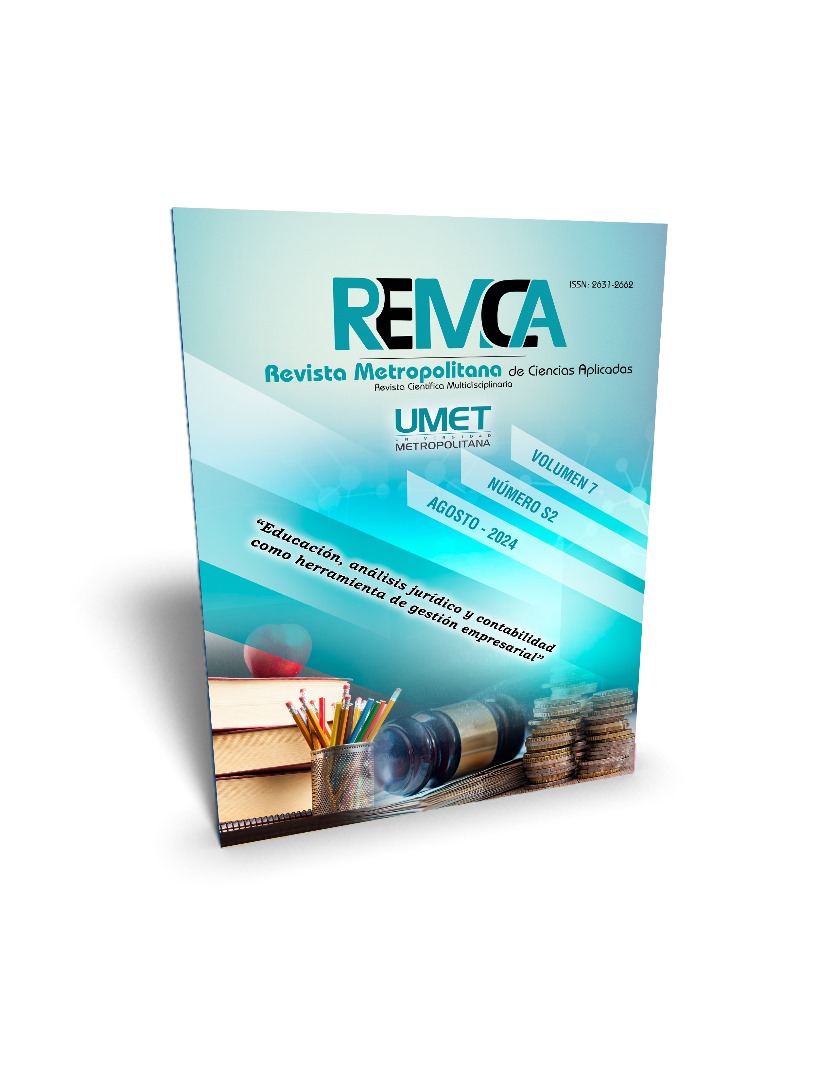Modernización de la contabilidad gubernamental en el Cantón Machala, Ecuador: desafíos y oportunidades
DOI:
https://doi.org/10.62452/t1hasy51Palabras clave:
Modernización, contabilidad, sector público, Estrategias, informaciónResumen
La mejora de la contabilidad gubernamental, esencial para la transparencia y eficiencia en la gestión de recursos públicos, es un tema de creciente importancia en contextos como el cantón Machala, Ecuador. Este estudio, que adopta un enfoque mixto combinando métodos cualitativos y cuantitativos, busca explorar y comprender los desafíos actuales y las oportunidades para la modernización del sistema contable. A través de encuestas dirigidas a contadores del sector público, se examinaron aspectos como la accesibilidad de la información financiera, los obstáculos como la escasez de recursos humanos especializados y la resistencia cultural, así como el potencial transformador de la tecnología en la mejora de procesos contables. Los hallazgos exponen la necesidad de estrategias integradas que incluyan colaboraciones internacionales, programas de capacitación y participación ciudadana para promover una gestión financiera más transparente y eficiente. Este enfoque holístico es decisivo para enfrentar los desafíos persistentes y avanzar hacia una administración pública más efectiva y responsable en el cantón Machala.
Descargas
Referencias
Andrade Donoso, M. S., & Cevallos Caza, K. G. (2020). Cultura tributaria en el Ecuador y la sostenibilidad fiscal. REVISTA ERUDITUS, 1(1), 49–62. https://doi.org/10.35290/re.v1n1.2020.290
Campo, A., & Pahlen, R. (2022). Informes contables gubernamentales con mediciones cuantittivas y cualitativas. (Ponencia). XVIII Simposio Regional de Investigación Contable. La Plata, Argentina.
Carrillo, X. (2021). Gestión financiera y administración de riesgos: portafolios de inversión, financiamiento, riesgos financieros y riesgos operativos. Estudios De La Gestión: Revista Internacional De Administración, (9), 8–9. https://revistas.uasb.edu.ec/index.php/eg/article/view/2577
Coronel, E., Narváez, C., & Erazo, J. (2020). Evaluación del proceso de planificación y del ciclo presupuestario para los Gobiernos Autónomos Descentralizados. Koinonía, 5(10), 63-83. https://doi.org/10.35381/r.k.v5i10.688
Díaz Jiménez, M.A., & Rico Bonilla, C.O. 2021. Educación sobre contabilidad gubernamental en Colombia: tendencias y retos . Apuntes Contables, 29, 117–140. https://doi.org/10.18601/16577175.n29.08
Díaz, C., Hernández, M., Ramírez, E., & Hernández, P. (2023). Experiencia en la implementación de la armonización contable en organizaciones públicas. Revista Academia & Negocios, 9(1), 51-61. https://www.redalyc.org/journal/5608/560874058006/html/
Ecuador. Ministerio de Economía y Finanzas. (2023). Informe de Sostenibilidad Fiscal 2023. https://www.finanzas.gob.ec/wp-content/uploads/downloads/2024/03/Informe-de-Rendicio%CC%81n-de-Cuentas-versio%CC%81n-final-publicar2023.pdf
García, Y., Barreto, L., & Uzcategui, L. (2022). Importancia de la información financiera en la toma de decisiones en las organizaciones. https://digitk.areandina.edu.co/server/api/core/bitstreams/d9c123dd-b269-4ae0-9127-47554a990747/content
Hernández, R., & Mendoza, C. (2018). Metodología de la investigación: Las rutas cuantitativas, cualitativas y mixta. Mc Graw-Hill.
Mayorga, T., Villacis, J., & Lara, D. (2020). La contabilidad gubernamental y su aporte al desarrollo económico del Ecuador. Revista cientifica FIPCAEC, 9(4). https://doi.org/10.23857/fipcaec.v5i4.304
Mejía Matute, S., & Pinos Luzuriaga, L. (2020). Sostenibilidad de las finanzas públicas en la economía ecuatoriana 2001 – 2019. Bolentín De Coyuntura, (25), 34–40. https://doi.org/10.31243/bcoyu.25.2020.920
Montesinos Julve, V. (2022). Contabilidad del sector público: objetivos, retos y oportunidades en un entorno incierto. Contaduría Universidad De Antioquia, (81), 91–118. https://doi.org/10.17533/udea.rc.n81a04
Reyes, J., Reyes, N., & Cárdenas, J. (2019). Contabilidad gubernamental y normas internacionales de contabilidad para el sector público ecuatoriano. Revista Venezolana de Gerencia, 24(88), 1179-1198. https://produccioncientificaluz.org/index.php/rvg/article/view/30172/31189
Saeteros, A., Narváez, C., & Erazo, J. (2020). La contabilidad gubernamental como herramienta de gestión de las instituciones públicas no fionancieras. Revista Arbitrada Interdisciplinaria Koinonía, 5(10), 226-246. https://dialnet.unirioja.es/servlet/articulo?codigo=7439115
Scavone, G., & Sanabria, V. (2023). Desafíos de la Contabilidad Gubernamental hacia la transparencia, el cumplimiento ético y la sustentabilidad. Revista La Junta, 6(2), 41–52. https://doi.org/10.53641/junta.v6i2.117
Subía, J., & Matilla, D. (2020). Cambios en la Administración Pública y su impacto en el sistema de control en el Ecuador. Economía y Negocios UTE, 11(1), 74-92. https://revistas.ute.edu.ec/index.php/economia-y-negocios/article/view/1066
Tabra Ochoa, E., & Sandoval Navarro, D. (2023). Los estados financieros y la información financiera en el gobierno de la sociedad anónima. THEMIS Revista De Derecho, (84), 133-148. https://doi.org/10.18800/themis.202302.008
Valencia, N., Chacha, R., & Pesantez, J. (2024). Contabilidad Gubernamental y Presupuesto Público en Fiscalidad del Cantón Pablo Sexto,Ecuador. SAPIENTIAE, 9(2), 224-223. https://dialnet.unirioja.es/descarga/articulo/9300179.pdf
Descargas
Publicado
Número
Sección
Licencia
Derechos de autor 2024 Evelyn Katherine Arévalo-Sisalima, Miryam Alejandra Montero-Cobo (Autor/a)

Esta obra está bajo una licencia internacional Creative Commons Atribución-NoComercial-CompartirIgual 4.0.
Los autores que publican en la Revista Metropolitana de Ciencias Aplicadas (REMCA), están de acuerdo con los siguientes términos:
1. Derechos de Autor
Los autores conservan los derechos de autor sobre sus trabajos sin restricciones. Los autores otorgan a la revista el derecho de primera publicación. Para ello, ceden a la revista, de forma no exclusiva, los derechos de explotación (reproducción, distribución, comunicación pública y transformación). Los autores pueden establecer otros acuerdos adicionales para la distribución no exclusiva de la versión de la obra publicada en la revista, siempre que exista un reconocimiento de su publicación inicial en esta revista.
© Los autores.
2. Licencia
Los trabajos se publican en la revista bajo la licencia de Atribución-NoComercial-CompartirIgual 4.0 Internacional de Creative Commons (CC BY-NC-SA 4.0). Los términos se pueden consultar en: https://creativecommons.org/licenses/by-nc-sa/4.0/deed.es
Esta licencia permite:
- Compartir: copiar y redistribuir el material en cualquier medio o formato.
- Adaptar: remezclar, transformar y crear a partir del material.
Bajo los siguientes términos:
- Atribución: ha de reconocer la autoría de manera apropiada, proporcionar un enlace a la licencia e indicar si se ha hecho algún cambio. Puede hacerlo de cualquier manera razonable, pero no de forma tal que sugiera que el licenciador le da soporte o patrocina el uso que se hace.
- NoComercial: no puede utilizar el material para finalidades comerciales.
- CompartirIgual: si remezcla, transforma o crea a partir del material, debe difundir su creación con la misma licencia que la obra original.
No hay restricciones adicionales. No puede aplicar términos legales ni medidas tecnológicas que restrinjan legalmente a otros hacer cualquier cosa que la licencia permita.




